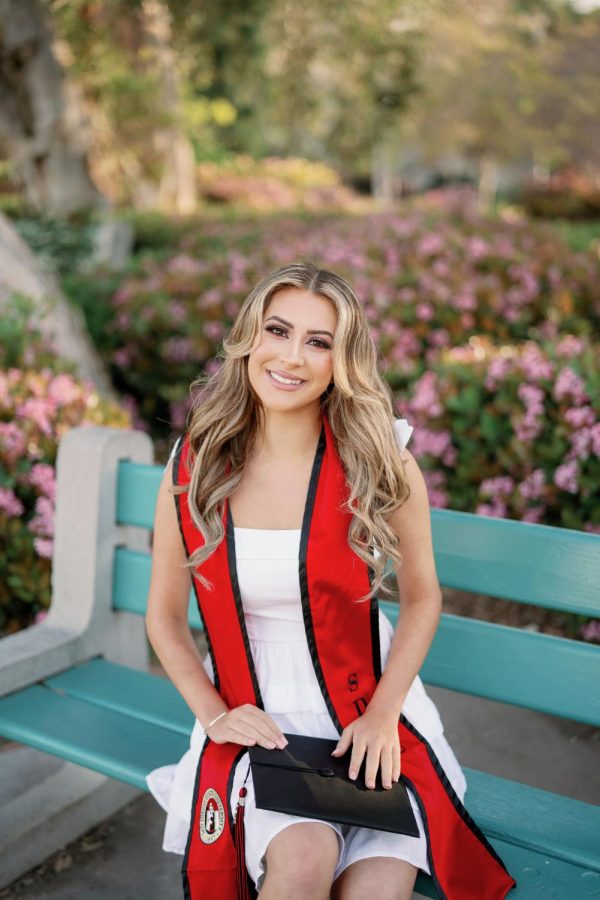Sandy Mekany’s journey to becoming San Diego State University’s first Truman Scholar has been encapsulated by resilience. The daughter of two Chaldean refugees hopes to empower others by reflecting on the challenges she faced in her educational experience as a first-generation American.
Mekany grew up in Scripps Ranch, a predominantly white community in San Diego County. As an adolescent, Mekany faced ethnic, gender and nativist based bullying during her K-12 learning.
“A lot of the time your classmates (in elementary school) can’t tell how well you’re able to speak English necessarily or what your culture is like because they’re not in your world or seeing it from your point of view,” Mekany said. “I had almost this resentment towards my own identity because I just wanted to match everybody’s idea of what it meant to be American.”
Mekany’s family was split when they came to the U.S. as refugees from Iraq in the ‘90s. Her father and SDSU alumni, Aiad Mekany, came to the U.S. in 1993. Her mother, Ban Mekany, and brother arrived in the U.S. in 1996 after temporarily living in Amman, Jordan.
Mekany says even though she began to doubt her own academic capabilities because her peers were not children of refugees like herself, she had some empowering teachers, which motivated her.
Mekany recalled a specific message about empowerment from her eighth-grade teacher Ms. Gillum that she still remembers today.
“She wrote my class a letter on our last day of eighth grade and it said, ‘do not be afraid of your differences. Our greatest strength comes from our acceptance of diversity,’” Mekany said. “In elementary school and in middle school, teachers wouldn’t necessarily address [bullying] or do much. When you do have teachers that do those things, it means the world.”
Mekany moved to attend Valhalla High School in El Cajon, which has a large Chaldean community. Even though Mekany was surrounded by more individuals of her own ethnic background in El Cajon, it was still a transition for Mekany to feel empowered by her culture.
Mekany initially felt hesitant to accept her own identity due to the way her self-view had previously been shaped in Scripps Ranch. Eventually, being surrounded by a new community in El Cajon propelled Mekany to celebrate her culture.
“I started seeing there’s people that look like me, there’s people who celebrate the same things as me,” Mekany said. “I’m so not used to this, but I see how beautiful it is.”
At Valhalla, Mekany took AP U.S. History and AP U.S. Government and Politics, which revealed to her that the self-judgment lens of young minority people is influenced by public opinion.
“I really enjoyed (the courses) because I started learning a lot more about how public opinion really does affect the way that young students view themselves and especially young women of color,” Mekany said. “I was a sophomore in high school when Donald Trump was elected, and a lot of attention started being thrown out to minority communities.”
Mekany watched both her parents re-obtain most of their education in the United States. Her mother, Ban Mekany, used to teach at Southwestern College in Chula Vista before working as an environmental engineer.
“It’s crazy to me that the very person that escaped war and poverty is now teaching in an entirely different country, supporting students in a border community,” Mekany said. “That’s something so special.”
Growing up, Mekany was exposed to Catholicism, the religion of many Chaldean communities in Iraq. Mekany learned the importance of her religion through her parents.
“My dad’s own house was bombed. He came back from work one day and everything was gone. I asked him, ‘What kept you strong during that time?’” Mekany said. “He told me that it was Jesus and the community that Jesus brought them.”
Mekany has applied a similar connection to her faith throughout her own challenges.
“Especially as a young child, who did I lean on? I leaned on the same figure that my parents did when they were escaping Iraq,” Mekany said. “That’s so beautiful because I find strength in my community in San Diego.”
The sense of empowerment that Mekany experienced at Valhalla High and at SDSU has instilled a passion in Mekany to continue advocating for other students.
As the Associated Students Vice President of University Affairs, Mekany led the Your Voice Matters campaign to address student concerns about the quality of their education through their experiences at SDSU. Mekany said her experiences hearing from students drives her to be an empathetic leader, which is something she learned from her parents.
“They really go out of their way to help others, but they won’t admit that. My parents constantly are empathizing with other people and empowering people,” Mekany said. “I strive to be empathetic. That’s what I take into my role now.”
In the future, Mekany hopes to advocate for students to feel supported by the broader education system through the support of the Truman Scholarship.
“When we start empowering students at a young age, we see the effects of that when they’re older and if we don’t, we see the opposite,” Mekany said.
With this mindset and her goal to become a civil rights lawyer for the U.S. Department of Education, Mekany seeks to exemplify that individuals from public universities and students of color can reach their full potential.
“I would say don’t be afraid to be the first,” Mekany said. “If you’re waiting to watch something happen, someone else is probably going to do it and they’re not going to represent the ideals that you want for the society that you’re in.”
Mekany will join the other 61 Truman Scholars in Missouri for a leadership week in May before studying Geopolitics this summer in Milan, Italy.







